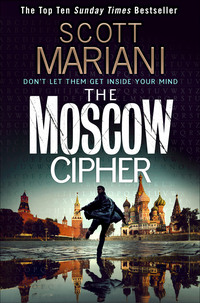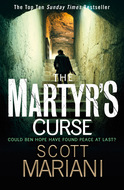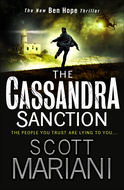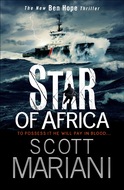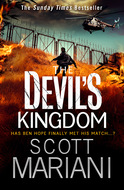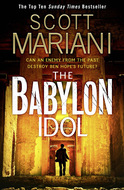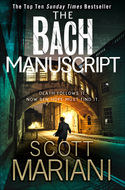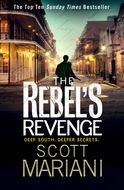Książki nie można pobrać jako pliku, ale można ją czytać w naszej aplikacji lub online na stronie.
Czytaj książkę: «The Moscow Cipher»
SCOTT MARIANI
The Moscow Cipher

Copyright
Published by Avon an imprint of
HarperCollinsPublishers
1 London Bridge Street,
London SE1 9GF
First published in Great Britain by HarperCollinsPublishers 2018
Copyright © Scott Mariani 2018
Cover photographs © Getty Images
Cover photographs © Arcangel
Cover design © Henry Steadman 2018
Scott Mariani asserts the moral right to be identified as the author of this work.
A catalogue copy of this book is available from the British Library.
This novel is entirely a work of fiction. The names, characters and incidents portrayed in it are the work of the author’s imagination. Any resemblance to actual persons, living or dead, events or localities is entirely coincidental.
All rights reserved under International and Pan-American Copyright Conventions. By payment of the required fees, you have been granted the non-exclusive, non-transferable right to access and read the text of this e-book on screen. No part of this text may be reproduced, transmitted, down-loaded, decompiled, reverse engineered, or stored in or introduced into any information storage and retrieval system, in any form or by any means, whether electronic or mechanical, now known or hereinafter invented, without the express written permission of HarperCollins.
Source ISBN: 9780007486250
Ebook Edition © May 2018 ISBN: 9780007486434
Version 2020-01-22
Join the army of fans who LOVE Scott Mariani’s Ben Hope series …
‘Deadly conspiracies, bone-crunching action and a tormented hero with a heart … Scott Mariani packs a real punch’
Andy McDermott, bestselling author of The Revelation Code
‘Slick, serpentine, sharp, and very very entertaining. If you’ve got a pulse, you’ll love Scott Mariani; if you haven’t, then maybe you crossed Ben Hope’
Simon Toyne, bestselling author of the Sanctus series
‘Scott Mariani’s latest page-turning rollercoaster of a thriller takes the sort of conspiracy theory that made Dan Brown’s The Da Vinci Code an international hit, and gives it an injection of steroids … [Mariani] is a master of edge-of-the-seat suspense. A genuinely gripping thriller that holds the attention of its readers from the first page to the last’
Shots Magazine
‘You know you are rooting for the guy when he does something so cool you do a mental fist punch in the air and have to bite the inside of your mouth not to shout out “YES!” in case you get arrested on the train. Awesome thrilling stuff’
My Favourite Books
‘If you like Dan Brown you will like all of Scott Mariani’s work – but you will like it better. This guy knows exactly how to bait his hook, cast his line and reel you in, nice and slow. The heart-stopping pace and clever, cunning, joyfully serpentine tale will have you frantic to reach the end, but reluctant to finish such a blindingly good read’
The Bookbag
‘[The Cassandra Sanction] is a wonderful action-loaded thriller with a witty and lovely lead in Ben Hope … I am well and truly hooked!’
Northern Crime Reviews
‘Mariani is tipped for the top’
The Bookseller
‘Authentic settings, non-stop action, backstabbing villains and rough justice – this book delivers. It’s a romp of a read, each page like a tasty treat. Enjoy!’
Steve Berry, New York Times bestselling author
‘I love the adrenalin rush that you get when reading a Ben Hope story … The Martyr’s Curse is an action-packed read, relentless in its pace. Scott Mariani goes from strength to strength!’
Book Addict Shaun
‘Scott Mariani seems to be like a fine red wine that gets better with maturity!’
Bestselling Crime Thrillers.com
‘Mariani’s novels have consistently delivered on fast-paced action and The Armada Legacy is no different. Short chapters and never-ending twists mean that you can’t put the book down, and the high stakes of the plot make it as brilliant to read as all the previous novels in the series’
Female First
‘Scott Mariani is an awesome writer’
Chris Kuzneski, bestselling author of The Hunters
‘I want a new invincible human being, insensitive to pain, resistant and indifferent about the quality of food they eat.’
Joseph Stalin, 1925
‘One may imagine that a man can create a man, not only theoretically but practically … a man who can fight without fear, compassion or pain. What I have just described might be worse than a nuclear bomb.’
Vladimir Putin, 92 years later
‘A man does not have the right to develop his own mind. We must electrically control the brain. Some day armies and generals will be controlled by electric stimulation of the brain.’
José Delgado, neuroscientist and pioneer of
Intracranial Radio Stimulation, paper presented to
US Congressional hearings on the Central
Intelligence Agency’s MK-ULTRA mind control
program, 1975
Contents
Cover
Title Page
Copyright
Praise
Epigraph
Prologue
Chapter 1
Chapter 2
Chapter 3
Chapter 4
Chapter 5
Chapter 6
Chapter 7
Chapter 8
Chapter 9
Chapter 10
Chapter 11
Chapter 12
Chapter 13
Chapter 14
Chapter 15
Chapter 16
Chapter 17
Chapter 18
Chapter 19
Chapter 20
Chapter 21
Chapter 22
Chapter 23
Chapter 24
Chapter 25
Chapter 26
Chapter 27
Chapter 28
Chapter 29
Chapter 30
Chapter 31
Chapter 32
Chapter 33
Chapter 34
Chapter 35
Chapter 36
Chapter 37
Chapter 38
Chapter 39
Chapter 40
Chapter 41
Chapter 42
Chapter 43
Chapter 44
Chapter 45
Chapter 46
Chapter 47
Chapter 48
Chapter 49
Chapter 50
Chapter 51
Chapter 52
Chapter 53
Chapter 54
Chapter 55
Chapter 56
Chapter 57
Chapter 58
Chapter 59
Chapter 60
The Ben Hope series
Keep Reading …
About the Author
By the Same Author:
About the Publisher
PROLOGUE
The city was Moscow and the date was February 10th 1957. It was to be the last night in Leo Ingram’s life, although he didn’t yet know it.
The bitter cold day was turning to a frigid evening as the deserted streets darkened, urging Ingram to turn up the collar of his heavy greatcoat and walk faster along the slippery pavement. His shoes were sodden from trudging through the dirty slush. The whistling wind carried flurries of snow that threatened to re-cover everything in white.
Ingram detested the unrelenting cold, as he detested the palpable fear and oppression that gripped this city. He could see it in the eyes of the people everywhere he went; could almost feel it oozing from the grey, dirty, ice-rimed streets themselves; and the same fear was pulsing deep inside his own heart that night as he carried out his mission.
Leo Ingram was his real name, as opposed to the identity shown on the forged papers he was carrying. His spoken and written Russian were easily good enough to pass for a native, as long as he didn’t get into protracted conversation with any of the locals, something he had studiously avoided since being smuggled into the USSR five weeks earlier. His cover had been carefully set up. For the last five weeks, as far as anyone was concerned, he had been Pyotr Kozlov, self-employed piano tuner. Had he been required to actually tune a piano as proof of his false identity, he could have done so, as that had been his profession before the war.
Quite how a mild-mannered, cultivated and peace-loving gentleman like Leonard Ingram could be transformed into a highly decorated British Army captain and then, post-1945, into a special agent of the Secret Intelligence Service: that was a testament to the deep, dark impact that terrible war had had on the lives of everyone it had touched.
Ingram’s mission in Moscow was nearly complete. He had been planted here to play a relatively brief role, but one that was key to the success of the operation. If all went well tonight, the five weeks of perpetual nail-biting tension, of constantly looking over his shoulder, half-expecting to see the KGB thugs coming for him at any moment, would be over and he would begin the journey home. Not that getting out of the Soviet Union would be an easy matter.
If all didn’t go well … Ingram closed his mind to that dreadful possibility.
The package thrust deep inside one pocket of his greatcoat was the first thing his plan required him to offload that night, before moving to the second phase. The package was innocuous enough at first glance, just an ordinary tobacco tin imprinted with Cyrillic lettering, identical to millions of others carried by millions of men across the USSR. But what that little round tin contained could not have been more explosive if it had been packed full of super-concentrated TNT. If they caught him with it, all was lost. Not just his own life, but all the efforts and risks taken by others in order to obtain the extremely precious and hard-won information inside.
As Ingram rounded an icy corner of the dark, empty street and a fresh blast of bone-chilling wind slapped him in the face and made his eyes water, the warehouses came into view. A mile’s walk from his rented digs, this industrialised zone of the city was even more dismal and rundown than the rest of Moscow. Most of the ancient pre-revolutionary buildings were semi-derelict and abandoned behind rickety fences nobody guarded. All the same, he was cautious. The failing bulb of a street light flickered on, off, on, off, throwing long shadows that he watched carefully in case they might conceal enemies with guns.
Satisfied he was alone, Ingram approached the fence and made his way along the snow-rimed wire mesh to the hole, large enough for a man of his slender build to slip through easily, he’d cut three nights earlier.
The warehouse was an old meat packing plant that hadn’t been used for many years, its doors rotted off their hinges. Ingram stepped over the half-eaten body of a frozen rat and moved into the darkness of the building. The hiding place was very specific. The package would remain there only a day or so before, if all went according to plan, his contact would collect it. It had been decided back at the start of the mission that a dead drop of this sort was a safer, more prudent way for the package to change hands. Ingram would have preferred to deliver it straight to his contact, but these were not his decisions to make.
The package carefully hidden, Ingram slipped unseen from the warehouse and continued on his way through the cold darkness. Phase two of the plan was the rendezvous with his colleague, a man he had never met and would never meet again after tonight. A small waterproof envelope in Ingram’s pocket contained a slip of paper on which were written four lines of code: an enciphered message that, among other information, gave precise directions to the location of the hidden package. Once the envelope was passed on, Ingram would walk away relieved of a tremendous burden. His part in the mission would effectively be complete as his contact decoded the directions using a special key known only to a select few, then retrieved the package and whisked it away to East Berlin, where others in their organisation would be anxiously waiting to take possession.
When the package finally reached the safety of London and its contents were analysed, it would cause a sensation. Careers would be made out of this, though the men and women who’d risked their lives to obtain the information would likely get little credit.
Ingram walked on through the half-deserted streets, checking his wristwatch and his bearings and glancing behind him now and then to ensure he wasn’t being followed. A police car hissed by, tyres churning brown slush on the road, and made his heart race for a moment before it passed on into the night without so much as slowing down to check him out.
His anxiety was peaking as he walked on. His meeting with his contact, however brief, would be the moment of maximum danger for both of them; when they would be at their most vulnerable if either of them had fallen under suspicion. To be caught together was their worst nightmare. ‘It’s almost over,’ he kept telling himself. ‘You’ll soon be home free.’
As Ingram crossed a sidestreet, a large figure of a man in a long coat and a brimmed hat appeared from nowhere and stepped towards him. ‘Good evening,’ the man said in accented English. He was smiling. His right hand was in his pocket, clutching a hidden weapon. And he was most certainly not the man Ingram was supposed to meet.
KGB. The acronym stood for Komitet Gosudarstvennoy Bezopasnosti, the Committee for State Security. A name that struck terror into the hearts of those who opposed the Soviet regime, as well as the Russian citizens it oppressed as virtual captives in their own homeland. The KGB had been created only three years earlier and already forged a fearsome reputation as a direct descendant of the dreaded Cheka secret police of the olden days. Its agents were as ruthless as they were efficient.
Ingram’s stomach twisted as he realised they were onto him. He bolted diagonally away across the icy street, then skidded and almost fell as a second figure appeared around the corner up ahead, cutting off his escape. The second agent wasn’t smiling and he had drawn his service automatic.
Had someone betrayed him? Had the KGB already caught his contact and made him talk? Had a mole inside his own agency given him away? Ingram didn’t have time to ask those questions as he sprinted off in the opposite direction with the two agents in pursuit.
A shot cracked out. Splinters of brickwork stung Ingram’s leg as he darted around a corner. He knew that the KGB would shoot to wound, not to kill. He also knew what kind of horrific tortures they would use to force information from him. He would give them nothing. He and his fellow agents had all been sternly lectured on the risks associated with getting caught. Like his colleagues, Ingram carried hidden in the heel of one shoe a small glass vial containing a cyanide pill, to be swallowed in the event of imminent capture. The death it offered was by no means a pleasant one – but it was, he had been assured, far quicker and kinder than the treatment a spy would receive at the hands of his or her captors.
He sprinted along a cobbled alleyway, vaulted a railing and almost broke his neck hurtling down a long flight of icy steps. A sharp right turn, then a left, then another right; and now Ingram was quite lost in the maze of dark narrow streets, but all that mattered was getting away from his pursuers. Escape was his only hope. Ingram had killed over a dozen enemy soldiers in the war and was quite proficient at armed combat, but the Secret Intelligence Service didn’t issue weapons to undercover agents posing as innocent piano tuners. The couple of tuning forks he carried about with him wouldn’t be much use.
He paused, heart pounding in his throat, breath rasping. Listened, hard, but could hear nothing. Had he lost them? Maybe, but he could afford to make no assumptions.
The cipher in his pocket. It must not be found. He snatched out the envelope and looked desperately around him for a hiding place to which, if he made it out of this, he could always return later. The buildings either side of the narrow street were old grey stone, slowly crumbling with decay and neglect. He ran his fingers along the rough, cold masonry, found a crack big enough, and stuffed the envelope inside it and poked it in deep with his fingers. Then he ran on, careering over the slippery pavement.
For a few elated moments longer he thought he’d given them the slip. That was when he heard the rapid thud of footsteps closing in behind him and in front, and realised they had him cornered.
He was done. Ingram felt the strange calmness that can sometimes come over a man when he knows, and accepts, that the end is here. He reached down and slid the false heel off his left shoe, trying to get to the cyanide pill inside before the enemy grabbed him; but his hands were numb with cold and he fumbled with the vial and accidentally let it slip from his fingers. He dropped to his knees, groping about in the shadows for it, but it was too late. Powerful hands seized his arms and yanked him roughly to his feet.
A pistol pressed against his head. If he could have struggled fiercely enough to make them blow his brains out, he would have, but then a cosh struck him hard over the back of his skull and knocked him half senseless. The KGB men dragged Ingram down the street to a waiting car where a third agent sat impassively at the wheel, smoking a cigarette. Ingram was bundled roughly inside. The two who had caught him sat to his left and right, boxing him into the middle of the back seat. The car sped off.
Its destination was the infamous Lubyanka prison and KGB headquarters in the heart of Moscow, where men highly expert in extracting the truth from their victims awaited their new arrival.
The last night of Leo Ingram’s life would be a very long and agonising one.
Chapter 1
The present day
Inside the confessional, filled with the serenity of the magnificent cathedral that was one of only two Catholic churches in his home city of Moscow, Yuri Petrov knelt humbly on the step and prepared to bare his soul to God.
On the other side of the grid, the priest’s face was half veiled in shadow. Yuri made the sign of the cross and, speaking low, began the sacrament as he’d been doing all his life.
‘Forgive me, Father, for I have sinned. My last confession was over two weeks ago and these are my sins.’
Yuri ran through the list of various lesser, venial sins, such as drinking and occasionally skipping his nightly prayers. But it was something else that was weighing so heavily on him and was the real reason he’d come seeking guidance. ‘I’m struggling with a great burden, Father,’ he explained nervously. ‘A terrible secret has been revealed to me and I don’t know what to do. I’m frightened.’
The priest listened sagely. ‘Would the right course of action be to share your secret, my son?’
‘Yes, Father. But in so doing, I could be in serious danger.’
‘The only danger is in doing wrong, my son.’
‘I know it’s wrong to lie, or hide the truth. I’ve done that too many times, Father. I’ve been used to keeping secrets, in my past career. But nothing like this. If I tell, I’m a dead man. I need God’s guidance on what to do.’
The priest reflected on this in silence for some time. ‘Pray to Him, my son. Open your heart to His wisdom, and the guidance you seek will be heard.’ Having given his counsel, the priest gave Yuri the penance of two Hail Marys, invited him to make an act of contrition, and ended the sacrament with the usual ‘Through the ministry of the Church, may God give you pardon and peace. I absolve you of your sins, in the name of the Father, and of the Son, and of the Holy Spirit.’
‘Amen.’
‘Go in peace. Do the right thing, my son.’
Yuri left the Cathedral of the Immaculate Conception and trudged down the steps to Malaya Gruzinskaya Street feeling scarcely any more reassured than before. Moscow was enjoying a warm June; the sky was blue and the sunshine was pleasant, but Yuri was too taken up with confusion and dread to notice. How had it come to this, he kept asking himself. As he walked away from the grand Gothic church, he cast his troubled mind back over the events of the last few days and the path his life had taken to lead him to this awful situation.
Yuri Petrov was thirty-nine years old, divorced, single, currently unemployed and going nowhere fast. The reason he’d been so used to keeping secrets in the past was that, for over fifteen years, he had been a spy for Russian intelligence, albeit a minor and lowly one. Not that any of his former neighbours or acquaintances in Amsterdam, where he had lived for ten of those years, would have known it. As far as anyone was concerned, even (especially) Yuri’s ex-wife Eloise and their daughter Valentina, he led the steady, plodding and unexciting existence of a senior technical support analyst working for an international software company based in the Netherlands. The ability to speak Russian being a key part of his phony job, the story fitted well and he’d carried it off for years without drawing suspicion. Each morning at eight he’d kissed his wife and cycled off to a fake office with a fake secretary, and got on with the real job of being an intelligence spook. Whatever that was, exactly.
While the Russian secret service had been stepping up its spying activities across Europe for some time and deploying their spooks on all kinds of cool missions such as nabbing state secrets, orchestrating cyber-attacks, infiltrating protest groups and generally helping to subvert the stability of nations, to Yuri’s chagrin he felt his own talents to have been woefully underused. He was not, never had been, Russia’s answer to James Bond. He had never carried, nor even handled, a gun, or been asked to do anything remotely risky. His role in Amsterdam was ostensibly to keep tabs on the intelligence agents of rival nations, but it seemed that his counterparts there had as little to do as he did – which all amounted to a life not much less drab and uninspiring than his fictitious cover, in which he had little to do except trawl the internet, drink too much coffee, eat too much stroopwafel, and become increasingly dissatisfied and frustrated with his career.
It hadn’t always been this way. Once upon a time, in the bygone days before he’d been sent into exile in Amsterdam, his Intelligence bosses had seemed to appreciate Yuri’s abilities. For Yuri might not have been endowed with many talents in his life, but for some reason and with very little effort on his part he just so happened to be a highly gifted code-cracker. Back in the day, Yuri’s capacity for deciphering signals intelligence – or ‘SIGINT’ as the Americans termed it – encryptions intercepted from rival agencies such as the Brits, the Yanks or those pesky Israelis had been second to none and earned him quite a reputation in Moscow. On several occasions, when Russian Intel operatives way above his pay grade had been unable to penetrate the firewalls protecting the secret files of MI6, CIA, Mossad and others, Yuri had been called in to assist. He’d cracked security passcodes that had been thought uncrackable, even complex fifteen-digit monsters that presented over 700 million billion billion permutations.
But that was long ago, before the relentless march of technology had taken all the intellectual challenge out of codebreaking and pretty much rendered talents like his obsolete. Nowadays it was all just a war between computers: one to weave the incredibly complex code, another to attack its defences, and the winner was simply whoever had the most powerful machine. With alarming rapidity, the human factor was being almost completely removed from the equation. After just a few years in the job, Yuri’s special skills had become increasingly redundant. Then came the Amsterdam posting, and the long, slow decline. Frustration grew to bitterness; bitterness to hatred: against his employers back home, and the whole damn government.
During this unhappy period he hooked back up with an old friend from school and began regular contact with him on social media. Yuri Petrov and Grisha Solokov had known each other since the age of seven, and had the usual on-off friendship until their teens, when they’d become best buddies for a while until Yuri drifted off to university in St Petersburg to study IT and Grisha went to work for his father, who owned a radio repair shop.
During the years the two friends had been out of touch, Grisha had discovered the wonderful world of conspiracy theories and become deeply immersed. The repair shop long gone, he now operated his own internet radio station from a hidden trailer at a remote farm many miles from Moscow. He lived alone with only a dog, an assortment of feral cats and a few goats and chickens for company, and spent most of every night in the trailer streaming his rants about everything from illegal government surveillance operations to chemtrails to the Illuminati plot to enslave the human race to the covert deportation camps that really existed, according to him, on Mars.
Needless to say, in their Facebook chats Yuri had never divulged to his friend what he did for a living, for that would have instantly branded him as the enemy. Grisha had his own secrets, too. Because his show frequently attacked what he considered to be the corrupt dark underbelly of the Russian state and its president in particular, he kept his location extremely hush-hush so as to elude the government assassins who he believed were intent on silencing him.
In short, Grisha was slightly nuts.
Looking back, Yuri couldn’t pinpoint the moment he’d started getting drawn into Grisha’s ideology. To begin with, he’d been dismissively sceptical of the whole thing, and almost stopped with the social media contact. The stuff his friend came out with was often more than Yuri could stomach, like his conviction that lizard-like alien beings capable of taking on human form really do run the planet, and that various celebrities as well as members of the British royal family were among these evil creatures hellbent on the total domination of humanity. But the more he’d listened to Grisha’s show, the more compelling Yuri started finding its less wacky theories of conspiracy and corruption at the heart of the global establishment. After all, Yuri was privy to facts and secrets that were kept from ordinary folks, and so it wasn’t hard for him to imagine that all kinds of levels of secrecy existed above him. Gradually, tiny doubts about his own government, and the state of the world generally, percolated through his head and wouldn’t go away, feeding his increasing sense of restlessness that he was a pawn working for dark powers.
Maybe it was just an expression of his dissatisfaction with his own job, he told himself. Yet the same creeping paranoia that fuelled Grisha’s radio show started haunting Yuri as he cycled the streets of Amsterdam. He became certain he was being watched and followed, his phone tapped, perhaps even his thoughts somehow monitored. A reasonably devout Catholic since his teens, he turned to God for moral support. When an answer to his fervent prayers failed to materialise, Yuri found solace in the sins of drink and marijuana, having developed a taste for both.
What made it so much worse was that he could never tell Eloise a word about his secret life, let alone the anxieties that plagued him. As a result he ended up barely speaking to her at all, with the inevitable consequence that she felt very neglected by him. When the marriage eventually fell apart, Yuri blamed the Russian intelligence services even more bitterly for his woes and took it as proof of their pernicious influence over society. Shortly after Eloise left him and took Valentina away to live in France, Yuri returned to Moscow, handed in his resignation and found alternative employment fixing computer bugs for private cash-paying customers. He managed to persuade Eloise to let Valentina, now ten, travel to Russia for visits. Eloise was difficult about it and barely spoke to him on the phone.
Yuri’s preoccupation with all things conspiracy-related had by then grown even more pervasive. Even if he wasn’t yet prepared to believe that shape-shifting alien lizards govern the planet, as a parent he was angry that his child would grow up as a drone of the globalist Deep State. He felt he needed to do something to make people wake up to the realisation that everything they thought they knew about the world was a lie. The media they trusted was simply an instrument for propaganda; the leaders they voted for in fact controlled nothing; the real rulers were hidden in the shadows and the whole concept of democracy was a carefully concocted myth.
